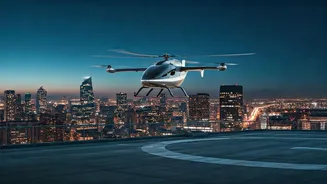Tax Cut Details
The most recent GST rate rationalization resulted in a substantial decrease in the tax applied to drones. The GST on drones has been brought down to just
5%, a significant change from previous rates. This reduction is designed to encourage the adoption of drone technology throughout the country. With lower costs, businesses and individuals may find it easier to integrate drones into their operations, potentially boosting demand. This tax adjustment aligns with the government's larger strategy to support technological advancement and innovation, making it more affordable to invest in these useful tools. It's a strategic move to stimulate the drone market and make it more inclusive and accessible across the board.
Industry Impact Assessment
The implications of this GST reduction could be far-reaching across various sectors. Agriculture, for instance, could benefit significantly, as farmers might find it more economical to use drones for crop monitoring and spraying, leading to more efficient farming practices. Similarly, the logistics and delivery sectors could see improvements as drones can be used to optimize delivery routes and handle packages more effectively, resulting in reduced costs and faster services. The construction industry could also leverage drones for site surveys and inspections, which would enhance project management. This tax cut is anticipated to drive growth and competitiveness within the drone industry, creating new opportunities. The reduction in the GST on drones is expected to be a catalyst for innovation and adoption, accelerating the use of drones across diverse industries.
Economic Benefits Unveiled
The economic advantages stemming from the tax cut are considerable. Lowering the cost of drones can stimulate the drone manufacturing sector, attracting investment and generating employment opportunities. Increased drone adoption can also contribute to the growth of ancillary industries such as drone maintenance, repair services, and pilot training, which would further boost the economy. Moreover, the integration of drones into various services can make them more efficient, leading to savings for businesses and consumers alike. As drone-related services become more accessible and affordable, it can spur the development of new business models and innovative applications. The overall effect is likely to create a positive cycle of economic growth, underpinned by lower operational costs and innovation.
Future Market Prospects
Looking ahead, the reduction in GST is expected to set the stage for substantial growth within the drone market. With the cost barrier lowered, more businesses and consumers are likely to adopt drone technology, which could lead to increased demand for various drone-related products and services. The government's supportive policies, coupled with the tax reduction, should attract more international and domestic investment, which would boost the growth of the drone industry. As the market expands, it will promote more innovation, resulting in advanced drone models and enhanced services. This will help to open up new revenue streams and contribute significantly to the overall economic ecosystem. The future looks promising, with continuous expansion and integration of drone technologies into numerous sectors.




















